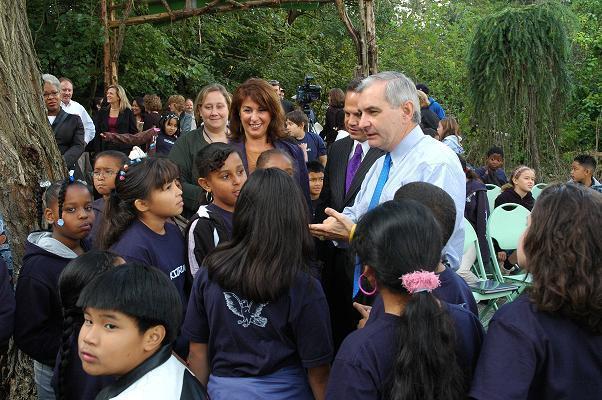
Lawrence Taft, executive director of the Audubon Society of Rhode Island, first noticed a problem back in 2003. That’s when schools, straining under skyrocketing transportation costs, started cutting back on field trips to the society’s education center in Bristol.
To keep the kids coming, the nonprofit started paying for the buses. A $50,000 annual grant from the state also covered some of the costs for urban schools. But now that grant is gone, a victim of this year’s state budget cuts.
“We’re limping along right now,” Taft said of the society’s programs for schoolchildren.
Taft is hoping legislation sponsored by U.S. Sen. Jack Reed, dubbed the “No Child Left Inside Act,” will change that. The measure would authorize $500 million over five years to states willing to strengthen environmental education programs and better connect kids with nature.
The name of the legislation is an obvious play on the No Child Left Behind Act. The federal law, passed in 2001, aimed to improve schools through higher standards and accountability measures. But many say its emphasis on reading and math has led schools to neglect other subjects, such as environmental studies. Local environmental groups say field trips, for example, have become increasingly rare.
Looking to build momentum for Reed’s bill, leaders of several local environmental groups, including the Audubon Society and Save the Bay, joined the senator on Oct. 11 for an “unveiling” of the bill at the renovated wetlands trail at Roger Williams Park Zoo.
With classes of fourth and fifth graders from Kizarian Elementary School in Providence and Our Lady of Mercy Regional School in East Greenwich looking on, Reed said that the need for environmental education outside the classroom is greater than ever.
“It’s not just something that is a nice thing to do, like it was years ago,” Reed said, noting the increasing concern with global climate change.
“The world is being shaped by powerful forces,” he continued. “How do we move from a petrol-based economy to one based on alternative fuels? How do we provide good water to all the people in the world? Those are environmental problems. They’re national security problems. They’re public health problems.”
The No Child Left Inside Act would provide federal funding – up to $100 million a year – to states to train teachers in environmental education and to conduct environmental programs. Funding would also to go to states that create environmental literacy plans. Reed said individual states could chose not to participate.
The legislation would also reestablish the Office of Environmental Education within the U.S. Department of Education.
Reed acknowledged in an interview that many educators have complained that other subjects – music and art, for example — have been neglected, too.
“But this is a way to not only pull together all the different strands of science, math, writing and reading, but it also is tremendously important in the world,” Reed said. “These children will be facing problems of instability caused by a lack of clean water, because basic environmental policies haven’t been adopted.”
Officials at Save the Bay said they’ve experienced fallout from the No Child Left Behind Act, with teachers canceling field trips to the organization’s headquarters because they need additional classroom time for either testing or to prepare for testing.
At the Audubon Society, Tate said about 33,000 students visit the education center annually, but it’s only that many because of the free transportation, provided with help from Amgen.
But that corporate support can’t last forever, he said, and the Audubon has been turning to its members to make up the difference. “With the tightening economic conditions, it’s tough for people to reach into their pockets,” Tate said. •











